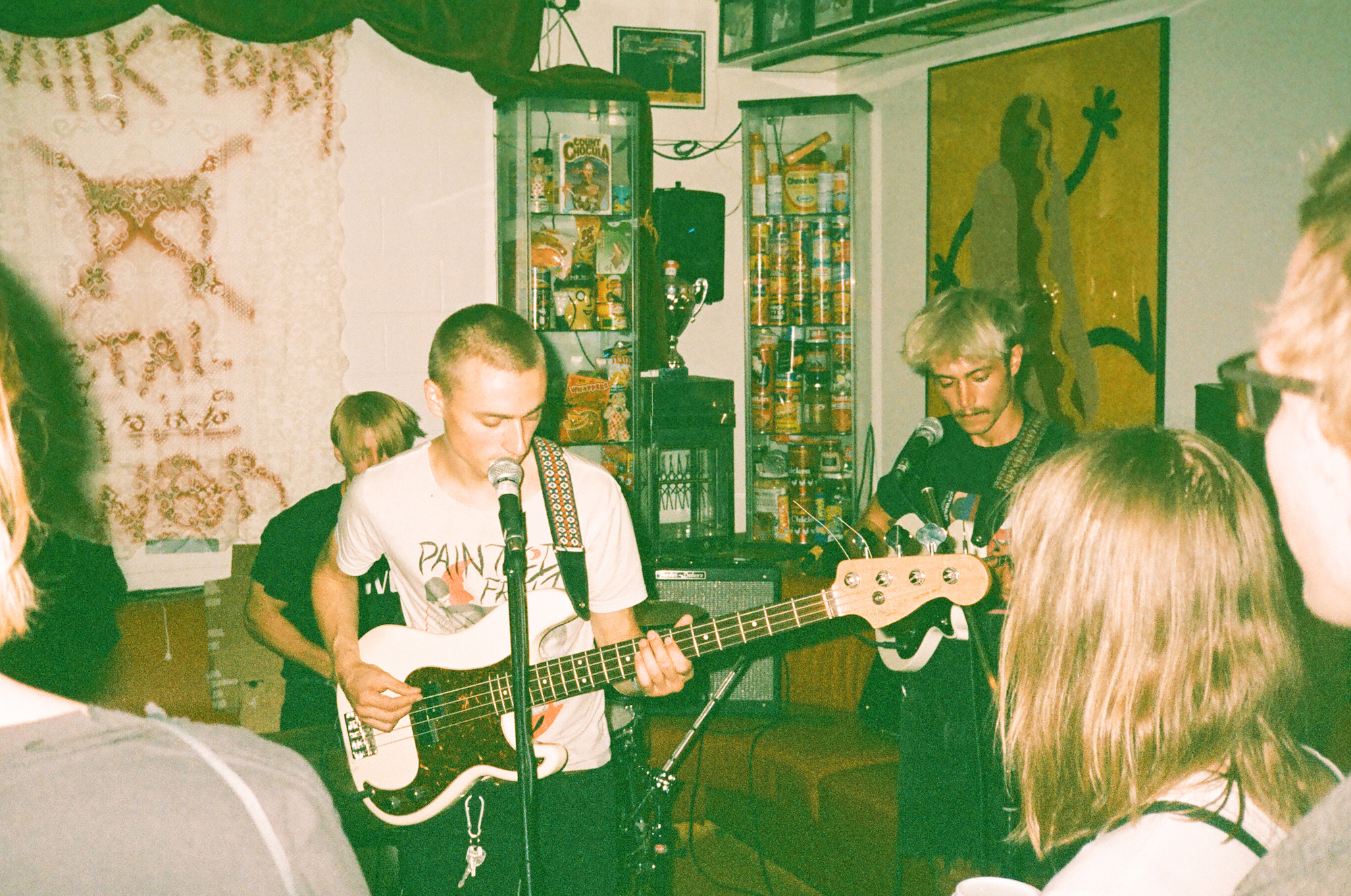The dawn of the hot dog craze is upon us, riding in on the fanfare of street food and food carts. It’s a gimmick so simple it’s hard to ignore — full on idolatry for a food named after a domestic animal. Vancouver’s Whatsup Hot Dog, itself based on cow-city’s Tubby Dog, is the latest testament to the hot dog revival. Calgary’s Tubby Dog, for its part, has been around since long before the craze — 2005 in fact — and was the site of this year’s Weird Canada showcase at the Sled Island Music Festival.
I’ll be honest — I think hot dogs are trash. Despite this, I wolfed one down during the daytime show. I got caught up in the sights and the smells of the overdressed sausages. Walking into Tubby Dog, with its arcade games and bright red countertops, teenagers fresh off of school, and festival-goers sharing a communal hangover, was like walking into a carnival — a travelling event set up at a local venue.
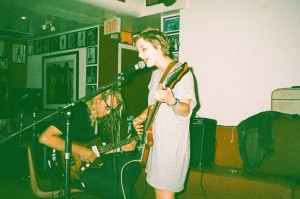
The opening act, Anamai, also boasted an impressive number of babies in the audience. A blanket was laid out across the linoleum floor, which I assumed at first was for the infant bobbing around with oversized, noise-cancelling headphones, until the first act of the carnival, Anamai, welcomed the audience to sit on the blanket and share the cramped space shoulder-to-shoulder. By all indication the infant could not hear the music. Its suspended bobbing was upbeat, joyous. The music was not. If anything, the music was an outlet for post-natal depression. The set was crushing. Anamai is both dark and sincere, with sludge and distortion overlaid by Anna Mayberry’s crisp, twangy vocals. Mayberry led the audience by a string, and the early afternoon set was one of the most resounding I saw during the festival.
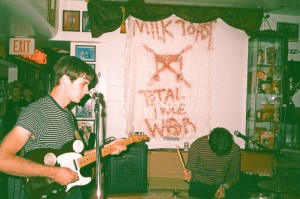
Milk Toast were on next, and started on a very different note. Described as “charming” in the Sled Island brochure, the set started with an extended electric guitar rendition of the Star Spangled Banner in full Jimi Hendrix glee. With little relation, sonically or otherwise, to the rest of their set, the opening felt extravagantly self indulgent. The band’s drummer, who had played the Hendrix opening, was chummy with the staff and eager to define himself as a local during between song banter. Milk Toast’s performance was lackluster and the music was unoriginal. After the last song of the set, which was underwhelming and low energy, the same drummer smashed his kit and used a guitar to assault the kit, leaving the lead singer looking perplexed and the next band with a punctured bass drum.
Smashing gear is a contentious issue. I’ve seen it done more than a few times, and even had friends trash their gear onstage. There’s a widely held opinion that trashing gear is arrogant if not outdated. There’s certainly a degree of financial waste that goes on when a musician trashes their gear. It’s excessive, but there’s usually a genuine frustration behind the gesture — the amp isn’t working, the show’s been a bust. I’m not sure if that’s better or worse than a principled act of destruction: devotion to complete performance or to raw emotion. The banner draped behind Milk Toast, proclaiming “Total Twee War” might indicate that the destruction was principled. The drummer’s mid-set banter with the staff of the venue made me think that smashing the kit was more about proving he had some sort of access to the space that the other touring bands, and the festival-goers, did not.
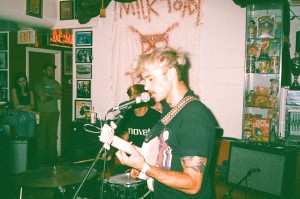
Regardless, by the time Painted Fruit went on, Tubby Dog had reached full capacity. The hot dog stand was filled with the brim, with people standing on booths and bending over the counter. Painted Fruit were hot off an extended tour as Johnny De Courcy’s backup band, and the cross-Canada escapade had left them polished. There was a groove to Painted Fruit, but a versatility as well, with the music taking on a chanting, anthemic quality as the set progressed. Between rapid fire jams and genre switch ups, Painted Fruit kept the crowd entertained.
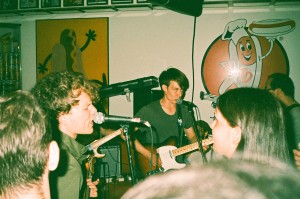
Fountain rode off of that energy and the anticipation for their third set of the festival. Teasing the audience with a false start, Fountain crashed into a slew of efficient, catchy melodies and steadfast drumming for the bustling audience who had begun to slowly shed their hangover
Vulva Culture’s closing set suffered from an audience exodus after Fountain. It was an odd curatorial choice to put them last, effectively sandwiching three high energy acts with two sludgy, emotional bands. While Painted Fruit and Fountain had been particularly cathartic, Vulva Culture’s heaving, fuzzy doo-wop was morose and self aware, more like wallowing in sadness then pushing it out. The hot dogs, once piled with syrup, potato chips and chilli, were coming off the counter a lot more slowly. The audience stood up against the counter, enticed by the slow, heavy sounds. The early afternoon sunshine had turned to grey, and the threat of rain was looming. The carnival drifted on.
Josh Gabert-Doyon
Supplementary Trip Report:
Unlike Josh, I am crazy about hot dogs. Street food will always be a great barometer for the local and specific, often the best means of sinking into a regional cuisine. Which is why, surely, Weird Canada, curators of the Canadian hyper-local, chose to settle at Tubby Dog for their Sled Island Showcase.
I’ll say this much. In Vancouver, you couldn’t conclude an alternative music festival with a pig roast.
Anyhow, Anamai — who I saw the previous night opening for Tortoise — played a smaller, more intimate set, unaccompanied by an additional guitarist. It’s ostensibly an odd choice given the space. Again, the gesture of the blanket was nice, having a place to sit and let the music redirect you to plaintive spaces.
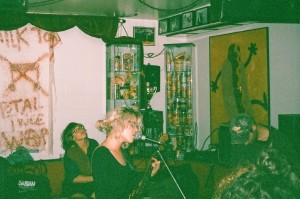
In a whiplash change of pace, Calgary locals Milk Toast were most interested in hyperbolizing what would seem to be the regular Tubby Dog mood. Boasting too many members and the shoegaziest of vocals, the mealy and indeterminate walls of sound had the more-is-less problem, sans some pointed drumming chops. Blame it on the surplus of guitarists to the side (or maybe deficit, why not just have a whole orchestra?) while only the drummer and vocalist popped out as focal points.
Other things bogged the set down for myself and Josh, say, Milk Toast’s MO of “Total Twee War.” As a sincere statement it’s reactionary, a refuge in twee as something unquestionably organic and radical, and not its own kind of cultural bludgeon against unhip outsiders. As irony it’d just be passé. Still, if there is one thing Milk Toast likely succeeded at, it was making music for their scene, engaging their community, and getting people to pick up instruments themselves, which really, is the only unqualified success any alt-rock suggesting resistance can claim. Too bad about trashing the kit then.
Of course, Painted Fruits and Fountain have been covered extensively in Discorder. Victoria has a knack for producing these bands, lean and angular, with a Gang of Four cool and a rhythmic force that Vancouver can’t match. And as Josh described, concluding with Halifax’s Vulva Culture was an odd choice. By then, the audience had more than halved, and precision runs were exchanged for Vulva Culture’s downbeat, Haligonian rhythms. Through no fault of their own, the crowd had moved on, and it felt hard not to move on with them.
Jonathan Kew


